Pediatric Residency Program
Teaching Conferences
| Teaching Conferences Weekly Schedule | |||||
|---|---|---|---|---|---|
| Time | Monday | Tuesday | Wednesday | Thursday | Friday |
| 7:30 - 8 am | Morning Report | Morning Report | Morning Report | ||
| 8 - 9 am | Grand Rounds | ||||
| 12 - 4 pm | Block Didactics | ||||
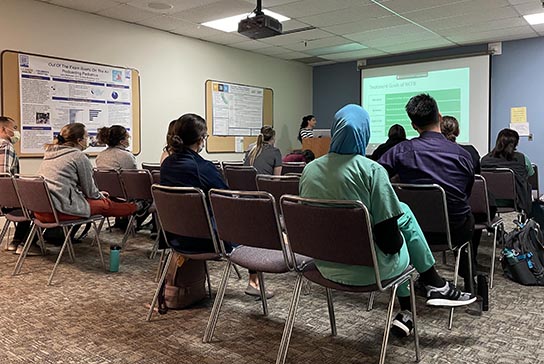
Morning report develops clinical reasoning skills through active participation from residents and faculty. The format of morning report is varied to allow use of different interactive learning experiences.
Chief residents facilitate case-based interactive discussions with residents, faculty, and students to foster critical thinking clinicals.
Skill-building sessions to allow residents the opportunity to practice skills such as interpreting EKGs, radiological studies, and blood gases.
Tuesday morning reports are dedicated to faculty-led intensive Pediatric Board preparation. These sessions allow residents the opportunity to practice taking board-type questions in a safe environment. Subspecialty faculty then teach to fill in knowledge gaps in their area of expertise and provide test-taking pearls to help ensure residents are well prepared for their pediatric board examination.
Monthly, residents present a quality improvement and patient safety morning report focused on utilizing quality improvement and patient safety tools such as root cause analysis and fishbone diagrams to effect systems level changes.
Monthly, interns on their Community Health and Advocacy rotation present a community health and advocacy morning report.
Monthly, a Wellness Wednesday morning report is dedicated to a wellness activity for our residents, such as pumpkin painting, yoga, or Waffle Wednesday.
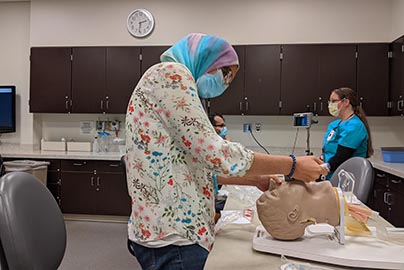
Thursdays from 12-4 p.m. are our dedicated block didactic conference time. Thursday block didactic sessions are led by diverse multidisciplinary and interdisciplinary faculty and staff. These sessions are presented in a variety of formats, including interactive case-based seminars, formal didactics, multidisciplinary and interdisciplinary workshops, and simulations. Didactic sessions are based on the content specifications from the American Board of Pediatrics General Pediatrics Certifying Examination and is structured on an 18-month repeating curriculum, allowing residents two opportunities during residency to solidify their medical knowledge in each of these areas.
The first hour of these block sessions are interactive resident and faculty integrated training experiences which allow residents and faculty to learn from each other. These sessions include our Case Management Conferences, Morbidity and Mortality Conferences, Journal Clubs, and Multidisciplinary Conferences.
During the first couple of months of the academic year, interns and senior residents have didactics tailored to their level of training. Intern didactics focus on developing knowledge and skills to help transition from medical student to effective pediatrician-in-training. Senior resident didactics focus on developing knowledge and skills to be effective senior resident clinicians, educators and leaders.
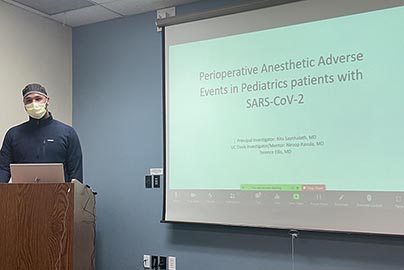
Once a month, the Program Director leads a case-based discussion of an interesting patient from the wards, PICU, NICU, or ambulatory setting. This conference serves as the major case review conference for the Department and is attended by residents, medical students, and faculty. The case is distributed the week prior to the conference and advanced preparation is expected. A chief resident presents the history and physical and then the finer points of the case are discussed in a very collegial atmosphere among residents and faculty. In addition to participation in the discussion, all participants weigh in on the differential diagnosis and management via audience response system. Faculty experts, including pediatric subspecialists, pediatric radiologists, pathologists, and pediatric surgical subspecialists provide their expertise to the discussion. The program director presents a PICO (patient, population, comparison, outcome) question related to the case and article that address the question. The issues may be basic or complex but are always interesting and this is consistently the most popular and well-attended conference.
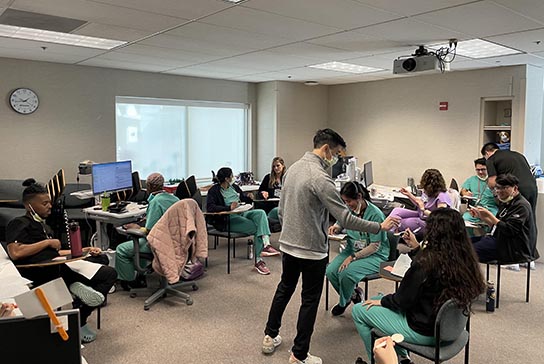
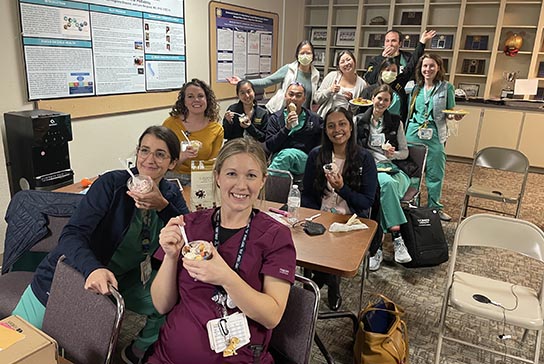
The goal of journal club is for residents to develop the self-educational skills required for continuing medical education after formal training is complete. Journal club develops residents’ ability to facilitate the formulation of (answerable) clinical questions, literature searches, and increase each resident’s comfort and expertise in using and critically appraising the primary medical literature.
Two residents are assigned to each journal club with the senior resident functioning as group leader. With the help of a faculty mentor, the group develops a specific clinical and/or PICO (patient/population, intervention, comparison, outcome) question related to a patient problem they have experienced. The group then conducts a thorough literature review and selects a high quality original research article that address the clinical question to aid in clinical decision-making. At the conference, the group leads the discussion on critically appraising the article’s methodology and results, and determining whether this article could apply to our patient population and should change our patient management at our institution. In addition, with the guidance of a faculty mentor or statistician, the senior resident teaches 1 evidence-based medicine topic related to their article (e.g. calculate NNT, interpret OR, RR, etc). This conference is a critical part of the program’s evidence-based medicine curriculum.
The Center for Simulation and Education Enhancement allows residents an opportunity to practice procedures and mock codes in a supportive, simulated environment. Procedure labs and mock codes are integrated into Intern Orientation, Thursday Block Didactics, as well as rotations such as pediatric emergency medicine, pediatric wards, neonatology, and pediatric critical care.
Every Friday morning, faculty, residents, as well as many community physicians gather at UC Davis Medical Center for Pediatric Grand Rounds, where a broad range of topics are presented by local, national, and international experts. This forum serves as a great opportunity to hear the latest from prominent experts.
Third-year residents develop a “state of the art” understanding of a specific topic and synthesize this information into a Grand Rounds presentation. Presentation of a mentored Grand Rounds allows residents, with the help of a faculty mentor, the opportunity to further develop their evidence-based medicine and presentation skills.
Mentored Grand Rounds Presentations
Upcoming Grand Rounds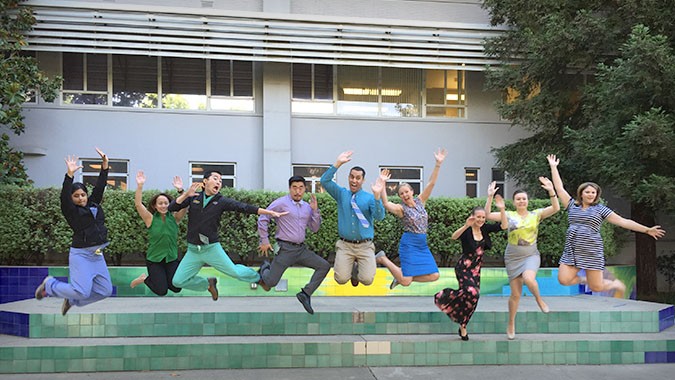
Contact Information
Residency Training Program
Department of Pediatrics, UC Davis Health
2516 Stockton Boulevard
Sacramento, CA 95817
Phone: 916-734-2428
Email: pedsresidency@health.ucdavis.edu
